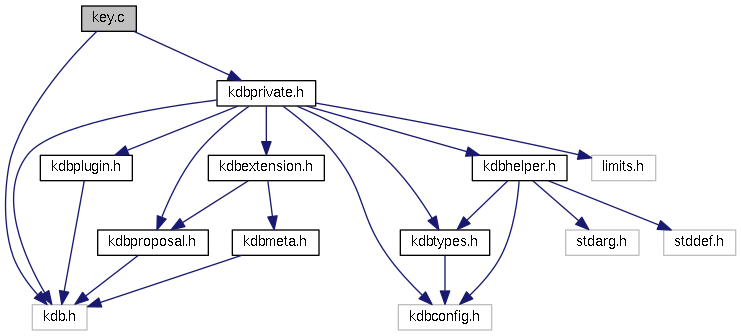Methods for Key manipulation. More...

Functions | |
| Key * | keyNew (const char *name,...) |
| A practical way to fully create a Key object in one step. More... | |
| Key * | keyVNew (const char *name, va_list va) |
| A practical way to fully create a Key object in one step. More... | |
| Key * | keyDup (const Key *source) |
| Return a duplicate of a key. More... | |
| int | keyCopy (Key *dest, const Key *source) |
| Copy or Clear a key. More... | |
| int | keyDel (Key *key) |
| A destructor for Key objects. More... | |
| int | keyClear (Key *key) |
| Key Object Cleaner. More... | |
| ssize_t | keyIncRef (Key *key) |
| Increment the viability of a key object. More... | |
| ssize_t | keyDecRef (Key *key) |
| Decrement the viability of a key object. More... | |
| ssize_t | keyGetRef (const Key *key) |
| Return how many references the key has. More... | |
Detailed Description
Methods for Key manipulation.
- Copyright
- BSD License (see doc/COPYING or http://www.libelektra.org)
Function Documentation
| Key* keyVNew | ( | const char * | name, |
| va_list | va | ||
| ) |
A practical way to fully create a Key object in one step.
To just get a key object, simple do:
If you want the key object to contain a name, value, comment and other meta info read on.
- Note
- When you already have a key with similar properties its easier to keyDup() the key.
You can call it in many different ways depending on the attribute tags you pass as parameters. Tags are represented as keyswitch_t values, and tell keyNew() which Key attribute comes next.
We can also give an empty key name and a KEY_END tag with the same effect as before:
But we can also give the key a proper name right from the start:
So, keyNew() allocates memory for a key object and keyDel() cleans everything up.
keyNew() processes the given argument list even further. The Key attribute tags are the following:
- KEY_VALUE
Next parameter is a pointer to the value that will be used. If no KEY_BINARY was used before, a string is assumed. - KEY_SIZE
Define a maximum length of the value. This is only used when setting a binary key. - KEY_META
Next two parameter is a meta name and a meta value. See keySetMeta(). - KEY_END
Must be the last parameter passed to keyNew(). It is always required, unless thekeyNameis 0. - ::KEY_FLAGS
Bitwise disjunction of flags, which don't require one or more values. recommended way to set multiple flags. overrides previously defined flags.Key *k=keyNew("user/tmp/ex3",KEY_FLAGS, KEY_BINARY | KEY_CASCADING_NAME, // flagsKEY_SIZE, 7, // assume binary length 7KEY_END); // end of args - KEY_BINARY
Allows one to change the key to a binary key. Make sure that you also pass KEY_SIZE before you set the value. Otherwise it will be cut off with first \0 in the string. So this flag toggle from keySetString() to keySetBinary(). If no value (nor size) is given, it will be a NULL key. - ::KEY_CASCADING_NAME allow the name to start with / useful for ksLookup() and kdbGet() parent/lookup keys
- ::KEY_META_NAME allow the name to start with arbitrary namespaces useful to compare with meta keys
- Deprecated:
- These other flags deprecated and KEY_META should be preferred. They remain some time, however, for compatibility:
- KEY_DIR
Define that the key is a directory rather than a ordinary key. This means its executable bits in its mode are set. But even without this option the key can have subkeys. See keySetDir(). - KEY_OWNER
Next parameter is the owner. See keySetOwner(). - KEY_UID, KEY_GID
Next parameter is taken as the UID (uid_t) or GID (gid_t) that will be defined on the key. See keySetUID() and keySetGID(). - KEY_MODE
Next parameter is taken as mode permissions (int) to the key. See keySetMode(). - KEY_COMMENT
Next parameter is a comment. See keySetComment().Key *k=keyNew("user/tmp/ex4",KEY_BINARY, // key typeKEY_SIZE, 7, // assume binary length 7KEY_COMMENT, "value is truncated",KEY_UID, 0, // root uidKEY_END); // end of args
- KEY_DIR
- Parameters
-
name a valid name to the key, or NULL to get a simple initialized, but really empty, object
- See also
- keyDel()
- Returns
- a pointer to a new allocated and initialized Key object.
- Return values
-
NULL on allocation error or if an invalid namewas passed (see keySetName()).
- Precondition
- caller must use va_start and va_end on va
- Parameters
-
va the variadic argument list
 1.8.8
1.8.8